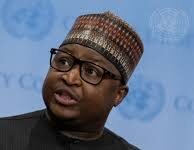President Bio has, on the 5th March, 2023 reiterated his commitment to the collective and shared responsibility to uphold the principles of the United Nations and affirmed his country’s renewed solidarity in advancing the Sustainable Development Goals (SDGs) and intensifying cooperation among Least Developed Countries, LDCs.
The President, who was speaking during the General Debate at the Fifth UN Conference on LDCs, also assured of the collective cause of the g7+, that Sierra Leone currently chairs, adding that that cause was already aligned with the Doha Plan of Action, which recognizes the nexus of peace and development.
“18 of the 20 g7+ countries are on the LDC list. This group of countries continues to be adversely and disproportionately affected by the current global crises. We, therefore, renew calls for debt relief and investments in connectivity and infrastructure that support economic diversification. Additionally, regional and global actors must support shared peace ecosystems while adhering to aid effectiveness principles such as respect for country ownership and leadership.
“Only by doing that can we achieve what this year’s theme promises – ‘from potential to prosperity.’ The theme, therefore, resonates with Sierra Leone’s aspirations. We are committed to implementing national strategies that are consistent with the Doha Programme of Action for the decade 2022-2031.
“We welcome the six focus areas that are aligned with Sierra Leone’s current Medium-Term National Development Plan (2029-2023). It will also be mainstreamed into our successor national development plan (2024-2028),” he said.
President Bio observed that the world had registered great transformation since the first UN LDC Conference in 1981, with some countries graduating from LDC status, but noted that the persistent structural global inequalities, the COVID-19 pandemic, recent geopolitical tensions, global economic headwinds and disruptions had reversed the gains most LDCs had made toward achieving the SDGs.
“We acknowledge that 14% of the global population lives in LDCs and continues to grapple with poverty, food insecurity and malnutrition, poor health care, and other structural challenges that further expose them to vulnerabilities. We therefore must scale up international and national efforts to urgently address the plight of this group of countries.
“Let me…express my deep gratitude to His Highness, Tamin Bin Hamad Al Thani, Emir of the State of Qatar, for consenting to host this Summit and for the warm hospitality, support, and outstanding facilities that have been placed at our disposal.
“Let me also commend the leadership of the LDCs for conducting the work of the group, providing support and forward momentum for our efforts, even during these very challenging times. We are grateful that you have actively protected the interests of the Group in the process of implementing the Programme of Action and the 2030 Agenda for Sustainable Development,” he said.
Celebrated for championing some of the biggest social capital projects in the recent history of the West African nation, President Bio also assured that his Government would continue to advance human capital development by investing in people through quality education, healthcare, and food security.
He added that their recent Gender Equality and Women’s Empowerment law had set legal minimums for the representation and participation of women in the private and public sectors. He said they would continue to prioritize interventions that address vulnerabilities and exclusion among women, girls, youth, the aged and the disabled.
“We will scale up radical inclusion, financial inclusion, skills development and job creation, and continue to pursue our National Social Protection Policy. Through the 10-year National Innovation and Digital Strategy (2019-2029) we will continue to facilitate and support a vibrant national innovation and entrepreneurial ecosystem for the public and private sectors.
“In-country, we will continue to implement our integrated national financing framework, scale-up financial digitalization, and strengthen our national systems for more effective resource mobilization and efficient use of public finances.
“We will accelerate efforts at addressing climate change and environmental degradation; diversify our economic activities with a renewed focus on boosting food production and agribusiness, tourism, fisheries, and light manufacturing. We can also generate significant regional trade volumes by implementing the African Continental Free Trade Area initiative.
“Let me conclude by expressing our sincere hope that within a spirit of multilateralism, we can galvanize significant global efforts to effectively address the challenges confronting the LDCs. By tackling those, we can ensure that ‘no country is left behind’ in the race to meet the UN 2030 SDGs,” he concluded.




